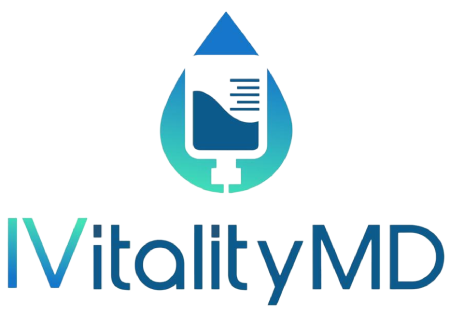Introduction: A Nation in Need of Root-Cause Healing
Across the United States, chronic disease has quietly become the biggest health challenge of our time. According to the Centers for Disease Control and Prevention (CDC), 6 in 10 American adults now live with at least one chronic illness, and 4 in 10 live with two or more. Conditions like diabetes, hypertension, heart disease, autoimmune disorders, and kidney disease are more common than ever before. This is where functional medicine plays an important role, offering root-cause solutions to help manage and prevent these long-term, progressive, and costly conditions—both financially and emotionally.
In Texas, and especially Houston, the burden is heavy. Texas has one of the highest rates of diabetes and kidney disease in the country. Houston, as one of the largest and most diverse cities in America, faces unique health challenges, with communities disproportionately affected by obesity, high blood pressure, and metabolic disease.
This crisis has left patients frustrated. Too often, they feel trapped in a cycle of prescriptions and procedures managing symptoms but never truly healing. This is where Functional Medicine steps in: a modern, science-driven, and patient-centered approach that looks beyond symptoms to identify the why behind illness.
But as Functional Medicine grows in popularity, confusion arises. Who is really qualified to guide you on this journey? Is every “functional medicine practitioner” equally trained? And why do credentials matter so much in your path to healing?
What Is Functional Medicine?
Functional Medicine is not about covering up symptoms. It is about digging deeper. At its core, Functional Medicine asks:
- Why is this happening?
- What is the root cause?
- How do we restore balance so the body can heal?
Instead of treating diabetes simply with insulin, Functional Medicine explores the triggers: inflammation, diet, environmental toxins, gut microbiome imbalances, stress, and genetics. Instead of prescribing antacids for reflux indefinitely, it asks whether there is a hidden food sensitivity, an infection, or an imbalance in stomach acid.
A Patient-Centered Approach
Unlike conventional models where a patient often gets a 10–15 minute appointment, Functional Medicine is thorough and investigative. A physician may spend an hour or more understanding your full health history, diet, lifestyle, stressors, and even exposures to environmental toxins. This comprehensive intake is paired with advanced laboratory testing from hormone panels and gut microbiome analysis to heavy metal screenings and inflammatory markers.
Data That Supports the Approach
- According to the National Institutes of Health (NIH), nearly 24 million Americans suffer from autoimmune diseases and many remain undiagnosed until the disease is advanced. Functional Medicine helps detect imbalances earlier.
- Research shows that lifestyle and nutrition interventions can reverse or prevent up to 80% of chronic diseases. This is exactly the foundation of Functional Medicine.
Functional Medicine is not “alternative medicine.” It is integrative and science-based. It takes the best of modern diagnostics and merges it with evidence-backed holistic therapies like nutrition, lifestyle medicine, detoxification, and regenerative modalities.
Who Can Call Themselves a “Functional Medicine Practitioner”?
Here lies the biggest point of confusion for patients. The term Functional Medicine practitioner is not standardized. It can mean very different levels of training and expertise:
Functional Medicine Physicians (MD/DO)
A Functional Medicine physician is a board-certified doctor typically an MD (Doctor of Medicine) or DO (Doctor of Osteopathic Medicine) who has completed years of medical school, residency, and often fellowship, in addition to specialized Functional Medicine training.
This depth of training allows them to:
- Diagnose complex diseases.
- Order and interpret advanced labs.
- Manage medications when necessary.
- Integrate natural therapies safely alongside conventional treatments.
Nutritionists, Dietitians, and Health Coaches
Nutritionists and dietitians play a critical role in supporting lifestyle change. They provide meal planning, education, and accountability. Health coaches often help with motivation, stress management, and daily habits.
But while they are important partners, they are not physicians. They cannot order advanced labs, prescribe medications, or manage complex chronic diseases.
Chiropractors and Other Providers
Some chiropractors and alternative practitioners take a few months of Functional Medicine coursework and then advertise as “Functional Medicine practitioners.” While their knowledge may add value in specific cases, the scope of training is far narrower than that of a physician.
Why Credentials Matter
When it comes to healing, the difference between a doctor trained in Functional Medicine and a coach or short-course practitioner is profound.
Years of Training vs. Months of Training
- A physician undergoes 4 years of medical school, 3–7 years of residency, and often fellowship training. That is nearly a decade or more of medical education before practicing independently.
- In contrast, many Functional Medicine “certificates” can be earned in 3–12 months, without any requirement for medical background.
Patient Safety and Disease Management
Mismanagement is not uncommon when credentials are overlooked. A patient with kidney disease, for example, may be given high doses of herbal supplements without considering the risk of worsening kidney function. Someone with autoimmune disease may undergo thousands of dollars’ worth of lab tests but never receive a clear plan of action.
Studies estimate that 12 million Americans are misdiagnosed every year in primary care alone. If misdiagnosis is already a risk in conventional medicine, imagine the stakes when care is placed in the hands of someone without full medical training.
Real-Life Example
A patient with fatigue may visit a non-physician practitioner, receive 20 supplements, and be told their labs are “normal.” Without physician-level training, subtle but critical patterns may be missed such as early autoimmune thyroid disease, anemia, or hidden kidney dysfunction. In contrast, a Functional Medicine MD integrates both conventional and functional testing, pinpoints the root cause, and creates a safe, targeted plan.
The Role of Functional Medicine Physicians vs. Other Practitioners
It is important to emphasize that everyone has a role in the healing journey.
- Nutritionists provide meal planning and education.
- Health Coaches offer accountability and motivation.
- Chiropractors support musculoskeletal alignment.
- Functional Medicine physicians lead the investigation and treatment of disease.
Think of it as building a house: a decorator, a carpenter, and a plumber all play essential roles. But when the foundation is cracked, you call an engineer. Likewise, when you are reversing chronic disease, you need the expertise of a Functional Medicine physician to guide the entire process.
IVitality MD: Houston’s Destination for Functional Medicine and Wellness
About Dr. Bismah Irfan, MD
At IVitality MD, we believe every patient deserves physician-level root-cause care. Our founder, Dr. Bismah Irfan, MD, is a U.S.-trained physician specializing in Functional Medicine, Nephrology, and Integrative Nutrition.
She combines years of medical expertise with a passion for holistic healing. Dr. Irfan’s unique background allows her to treat complex conditions with precision, whether it’s kidney disease, autoimmune illness, diabetes, or chronic fatigue.
Services at IVitality MD
IVitality offers a wide range of evidence-based therapies designed to restore balance and vitality:
- IV Detox Therapy for hydration, nutrient replenishment, and detoxification.
- EBOO (Extracorporeal Blood Oxygenation and Ozonation) for advanced detox and immune support.
- Ozone Therapy for cellular healing and infection control.
- Hyperbaric Oxygen Therapy (HBOT) for energy, tissue repair, and brain health.
- PEMF (Pulsed Electromagnetic Field Therapy) for inflammation and cellular regeneration.
- Red Light Therapy for mitochondrial health and recovery.
- Hijama (Wet Cupping) for circulation and detox support.
Why Houston Needs This Care
Texas has one of the highest rates of diabetes and obesity in the U.S., with Houston ranking among the top cities for chronic disease prevalence. The city’s diverse population faces unique health disparities, making physician-led Functional Medicine especially vital. At Ivitality MD, we are committed to closing that gap by delivering advanced, integrative care rooted in science, compassion, and a personalized approach to lasting wellness.
Conclusion: Your Health Deserves the Right Guide
This approach represents the future of healthcare—personalized, integrative, and focused on true healing. But as the field expands, patients must choose wisely. Not all practitioners have the same training, expertise, or approach, making it essential to select a trusted physician who can provide safe and effective care.
When managing chronic illness or aiming for disease reversal, working with a physician ensures safety, depth, and results. Nutritionists, coaches, and other providers are valuable allies, but the leadership of a trained doctor makes all the difference.
At IVitality MD, Dr. Bismah Irfan, MD, combines the rigor of modern medicine with the vision of holistic healing. Here in Houston, we are building a model of care that restores vitality, prevents disease, and empowers patients to thrive.👉 Your next step: Book a consult with IVitality MD and begin your journey to true healing today.

